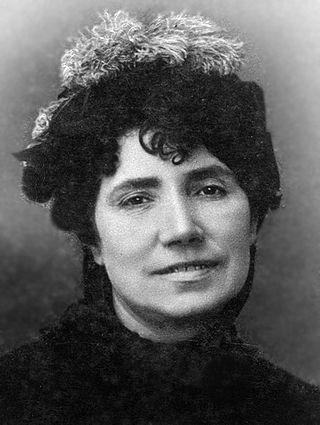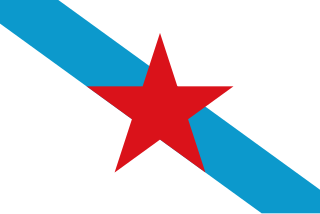
María Rosalía Rita de Castro, was a Galician poet and novelist, considered one of the most important figures of the 19th-century Spanish literature and modern lyricism. Widely regarded as the greatest Galician cultural icon, she was a leading figure in the emergence of the literary Galician language. Through her work, she projected multiple emotions, including the yearning for the celebration of Galician identity and culture, and female empowerment. She is credited with challenging the traditional female writer archetype.

The Galician Nationalist Bloc is a political party from Galicia, formed with the merger of a series of left-wing Galician nationalist parties. It is self-defined as a "patriotic front".

Galician–Portuguese, also known as Old Galician–Portuguese, Old Galician or Old Portuguese, Medieval Galician or Medieval Portuguese when referring to the history of each modern language, was a West Iberian Romance language spoken in the Middle Ages, in the northwest area of the Iberian Peninsula. Alternatively, it can be considered a historical period of the Galician, Fala, and Portuguese languages.

Alfonso Daniel Manuel Rodríguez Castelao, commonly known as Castelao, was a Galician politician, writer, painter and doctor. He is one of the fathers of Galician nationalism, promoting Galician identity and culture, and was one of the main names behind the cultural movement Xeración Nós. He was also one of the founders and president of the Galicianist Party and had a great influence on the renovating group of Galician art known as Os renovadores. Castelao is considered to be the most important figure in Galician culture of the 20th century.

Ricardo Carballo Calero, self-styled as Ricardo Carvalho Calero from 1981 onward, was a Spanish philologist, academic and writer. He was the first Professor of Galician Language and Literature at the University of Santiago de Compostela. He was a member of the Royal Galician Academy, the Lisbon Academy of Sciences, and also an honorary member of the Galician Language Association. He was one of the main theorists of contemporary Galician reintegrationism and his works on this field are considered a primary reference. Many consider Carballo Calero as one of the most prominent figures of the twentieth century Galician intelligentsia.

A Nosa Terra was a Galician newspaper in Galician language, first founded in 1907 in A Coruña, Spain. It has been published in different periods.
Reintegrationism is the linguistic and cultural movement in Galicia which advocates for the unity of Galician and Portuguese as a single language. In other words, the movement postulates that Galician and Portuguese languages not only shared a common origin and literary tradition, but that they are in fact variants of the same language even today. According to this, Galicia should re-integrate into the Community of Portuguese Language Countries.

Galician nationalism is a form of nationalism found mostly in Galicia, which asserts that Galicians are a nation and that promotes the cultural unity of Galicians. The political movement referred to as modern Galician nationalism was born at the beginning of the twentieth century from the idea of Galicianism.

The Galician Language Association is a reintegrationist association established in 1981 which seeks the full restoration ("re-integration") of Galician as a branch of Galician-Portuguese. It also aims for the official incorporation of Galicia into the Community of Portuguese Language Countries. It was originally formed by professional linguists only, although membership was soon made available to individuals showing an interest in the promotion of Galician culture, language, and the ideas of linguistic reintegrationism.

Xosé Manuel Hixinio Beiras Torrado is a Galician politician, economist, writer and intellectual. He is professor of Structural Economy at the Faculty of Economic Sciences of the University of Santiago de Compostela. He is a former member of the National Council of the Galician Nationalist Bloc, he is currently the leader of Renewal–Nationalist Brotherhood, an independentist political party. He formerly had representation in the Galician parliament.

Galician, also known as Galego, is a Western Ibero-Romance language. Around 2.4 million people have at least some degree of competence in the language, mainly in Galicia, an autonomous community located in northwestern Spain, where it has official status along with Spanish. The language is also spoken in some border zones of the neighbouring Spanish regions of Asturias and Castile and León, as well as by Galician migrant communities in the rest of Spain, in Latin America including Puerto Rico, the United States, Switzerland and elsewhere in Europe.
Moncho Iglesias Míguez is a Galician writer and translator.

Manuel Oreste Rodríguez López was a Galician poet and writer.

Carlos Casares Mouriño was born in Ourense on 24 August 1941 and died in Nigrán on 9 March 2002. He was a Galician language writer.

Commitment to Galicia is a Galician political party with a Galician nationalist, progressive ideology.
The Galician Rural Federation is a Galician farmers and breeders union centered on family farms and small peasants. The organization has its origins in a split of the Sindicato Labrego Galego-Comisións Labregas (SLG) in 2009. The splitters, that later founded FRUGA, wanted the SLG to take a closer political line to the Galician Nationalist Bloc and the Galician People's Union. FRUGA is particularly strong among milk cows small farmers.

Antón Losada Diéguez was a writer, Galician politician, member of the Irmandades da Fala of Ourense, promoter of the magazine Nós and correspondent of the Royal Galician Academy. He was author of half a dozen books of poetry, seven books, two political writings, the incomplete work A domeadora and the speech Ouservacións encol da prosa galega. He became a member in the Seminar of Galician Studies. He was honoured on the Day of the Galician Letters of 1985.

Manuel María Fernández Teixeiro, better known as Manuel María, was a Spanish poet and academic who wrote in the Galician language. He was notable for his combative character and his political commitment. His poetry touched on themes of love, art, his own political commitment, drawing attention to wrongs, ethnography, physics, history, immateriality, mythology, the animal world, poetic expression, the passing of time, religion, society, language, agricultural labour, urbanism, and geography. The Day of Galician Literature was devoted to him in 2016.

Galicia irredenta or Galicia estremeira, also spelled as Galiza irredenta and Galiza estremeira and also known as Faixa Leste or Franxa Leste, is a term used for all Galician-speaking territories located outside of Galicia. These are all located in Spain, in either Asturias or Castile and León. These territories are sometimes divided into three subregions: El Bierzo, Eo-Navia and As Portelas.

Os Renovadores or Os Novos was a group of artists who wanted to renew the visual Galician arts from the 1920s.

















